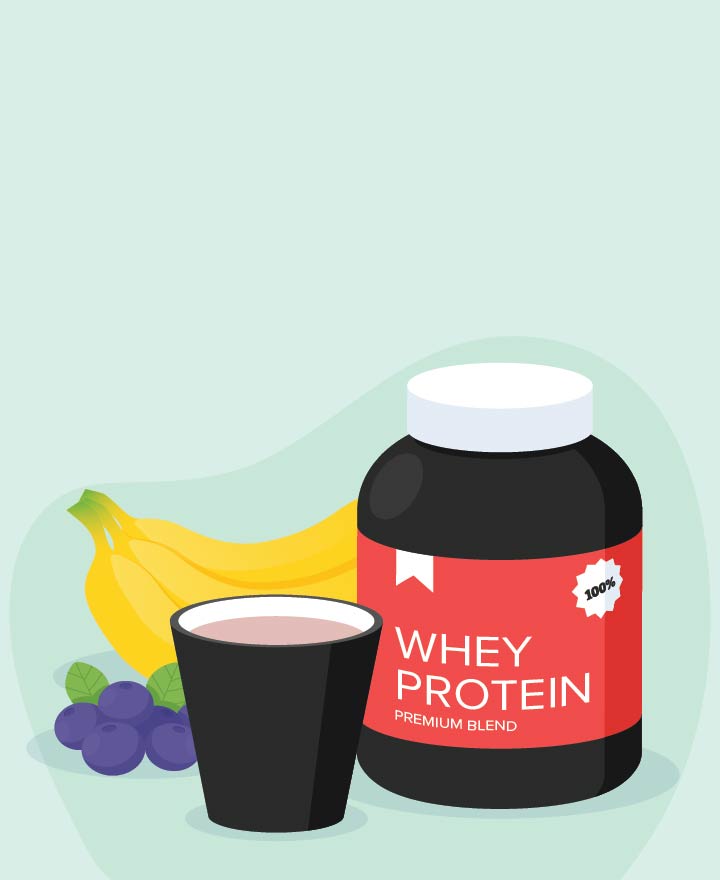

Is Too Much Protein Powder Bad for You?
There are a lot of misconceptions and myths related to use of protein powder. While there are known advantages of protein, some believe that excessive intake of protein powder can have harmful effects on the body. Read on to know more.
What is Protein Powder?
Protein powders are powdered forms of protein that come from plants (soybeans, peas, rice, potatoes, or hemp), eggs, or milk (casein or whey protein). The powders may include other ingredients such as added sugars, artificial flavoring, thickeners, vitamins, and minerals. People generally use protein powder post-workout to help in muscle growth or to balance their daily diet.
Is Protein Powder Bad for You?
Many people think that whey protein is harmful for their health, however, when taken in moderate doses, it is not harmful. In fact, it’s a convenient source of protein that helps many people meet their daily protein needs. However, in case you have any type of protein-related allergy or health condition, then you must consult your doctor before using it.
Myth vs Facts about Protein Powder
Some popular misbeliefs regarding the consumption of protein powder state that it is harmful to your kidney, liver and bones. Well, these are proven to be untrue and you can find more information in the following:
Myth :
High Protein intake can cause Osteoporosis
Fact :
It promotes bone health by improving bone density and lowers risk of fractures
Myth :
Protein Powder intake affects kidney and liver function
Fact :
Unless you have chronic kidney disease or decreased kidney function, consuming protein powder and other high protein foods is likely safe.
Potential Digestive Issues
Normally, protein powder is safe however, if consumed in excess amount then one may experience digestive side effects. Also, if you’re lactose intolerant or otherwise sensitive to lactose, dairy-based protein powder may lead to stomach upset, bloating, and gas. In such cases, one should opt for a plant-based protein powder or try whey protein isolate.
How Much is Too Much?
There’s no known safety limit for protein powder. Most research shows healthy people can tolerate up to 1.5 grams of protein per pound (3.3 grams per kg) of body weight per day from both food and protein supplements with no side effects.
Is Protein Powder Safe for Children and Teens?
Protein is an essential component for growth and development during childhood and adolescence. Children and teens should aim to get their protein from food first to ensure they’re getting enough calories and nutrients. However, if the child is malnourished, is a picky eater, or has strict dietary restrictions, then the health care professional might recommend a protein supplement. Also, while there is no data to suggest that protein powder is harmful to children and teens, relying on protein powder and supplements may displace nutritious, whole foods in the diet. Therefore, protein-rich whole foods should come first
Conclusion
Protein powder is indeed safe to use and consuming it in large amounts doesn’t give rise to vital protein powder side effects. Still, it’s best to get most of your protein from whole, minimally processed foods and use protein powder only to address any unmet protein needs.The best protein powders will be third-party tested, contain 20–30 grams of protein per scoop, and contain ingredients you can personally tolerate.
Sources: Healthline, Medical News Today, Iceshaker
Disclaimer: This blog provides general information and discussions about health and related subjects. The information and other content provided in this blog, website or in any linked materials are not intended and should not be considered, or used as a substitute for, medical advice, diagnosis or treatment. Kindly contact your Doctor before starting a new medicine or health regime.
Related Articles
Nutrition Matters - Eat Healthy To Maintain Fitness!
Here's How Your Nutritional Needs Change As You Age
How to Start a Diet and Sustain it?
From Staying Active To Reducing Risk Of Diseases, Here’s Why Fitness & Health So Important For Us
Planning To Go On A Diet? Here Are 5 Questions To Ask First
Published on October 04, 2022






 Health Insurance
Health Insurance  Travel Insurance
Travel Insurance  Car Insurance
Car Insurance  Cyber Insurance
Cyber Insurance  Critical Illness Insurance
Critical Illness Insurance
 Pet Insurance
Pet Insurance
 Bike/Two Wheeler Insurance
Bike/Two Wheeler Insurance  Home Insurance
Home Insurance  Third Party Vehicle Ins.
Third Party Vehicle Ins.  Tractor Insurance
Tractor Insurance  Goods Carrying Vehicle Ins.
Goods Carrying Vehicle Ins.  Passenger Carrying Vehicle Ins.
Passenger Carrying Vehicle Ins.  Compulsory Personal Accident Insurance
Compulsory Personal Accident Insurance  Travel Insurance
Travel Insurance  Rural
Rural